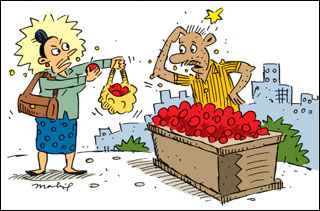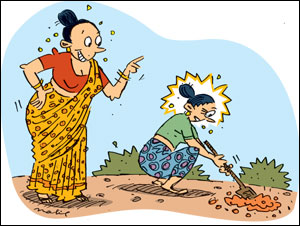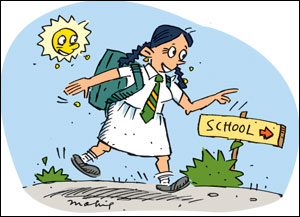|

by R. S. Karunaratne
Use 'most'
meaningfully
The simple but useful word 'most' is a determiner and pronoun. It is
also the superlative form of ;much, many.'
Most boys like to play cricket.
Taj Mahal is the most interesting place I have visited.
|

Most of the apples are
spoilt. |
Of all Shakespeare's plays, I like 'Macbeth' the most.
'Most' is used to talk about nearly all of a group in general.
Most children are honest.
Most of the apples are spoilt.
Most of our milk products come from Australia and New Zealand.
Most people eat fish, but not meat.
'Most' can be used to talk about nearly all of a particular group.
Most of the vegetables grown in villages are bought by middlemen.
Most of my friends live in the United States.
'Most' is used to talk about a larger amount than anything or anyone
else.
France produces the most wine.
All of us ate a lot at the party, but Chitra ate the most.
'Most' is used to say that something happens or is true to the
greatest degree possible.
What you need most is a decent job.
Which house do you like the most?
When used formally 'most' means 'very'
'Nettukkari' is a most beautiful play.
'Most' is used in certain set phrases.
|

What you need most is a
decent job. |
I will take a month to complete the project report, or two months at
most (= the maximum)
Of the three girls, this is the one I like most. (used for emphasis)
Most of the time I miss the office train. (= nearly all the time)
I had to make the most of my short stay in India. (= get the maximum)
Use 'most of' before a plural noun.
Most of us were poor students.
Most of the domestic helpers are dishonest.
Most of the English teachers are not proficient in the language.
If there is no pronoun or determiner in front of the plural noun,
just use 'most'
Most students are lazy to get up early in the morning.
Most bakeries sell cakes in addition to bread.
Ragging takes place at most universities.
'Mostly' is an adverb meaning 'mainly' or 'usually'
Grave crimes are committed mostly in cities.
The devotees at temples are mostly women.
Activity
Use 'more' or 'most' in the blanks:
1. Which is -- interesting: a book or a video?
2. If you learn -- you can pass the exam.
3. Out of all the subjects I enjoyed -- Logic.
4. I like -- vegetables except cabbage.
5. What was the -- difficult subject?
6. -- the merrier!
7. Which of these pens do you like --?
8. She likes the bus, but she says the train is....comfortable.
9. That was the -- interesting film I've ever seen.
10. This is a rare opportunity, so make the -- of it.
**************
Key
1. more interesting
2. learn more
3. enjoyed most
4. most vegetables
5. most difficult
6. more
7. most
8. more comfortable
9. most interesting
10. the most
**************
Starters:
Strong and weak verbs
Strong verbs are those which form their past tense by a change of the
present tense.
Students begin their studies at 8 am (simple present tense)
Students began their studies at 8 am (past tense)
|

I walked to school. |
We see a lot of tourists coming to Sri Lanka. (simple present tense)
We saw a lot of tourists coming to Sri Lanka. (simple past tense)
She eats bread in the morning. (simple present tense)
She ate bread in the morning. (simple past tense)
Boys sleep in the dormitory. (simple present tense)
Boys slept in the dormitory. (simple past tense)
Weak verbs are those which form their past tense by the addition of
'-d, -ed, or '-t' to the present tense. These verbs are easy to
remember.
Present tense
1. We help others in need.
2. What do you mean?
3. I walk to school.
4. I park my car under a tree.
5. They laugh loudly when the
teacher is away.
Past tense
1. We helped others in need.
2. What he meant was not clear.
3. I walked to school.
4. I parked my car under a tree.
5. They laughed loudly when the teacher was away.
*********
Here is a short list of
strong verbs
present tense
1. give
2. awake
3. write
4. drive
5. swim
6. bind
7. speak
8. begin
9. forgive
10. make |
Past
tense
1. gave
2. awoke
3. wrote
4. drove
5. swam
6. bound
7. spoke
8. began
9. forgave
10. made |
|

